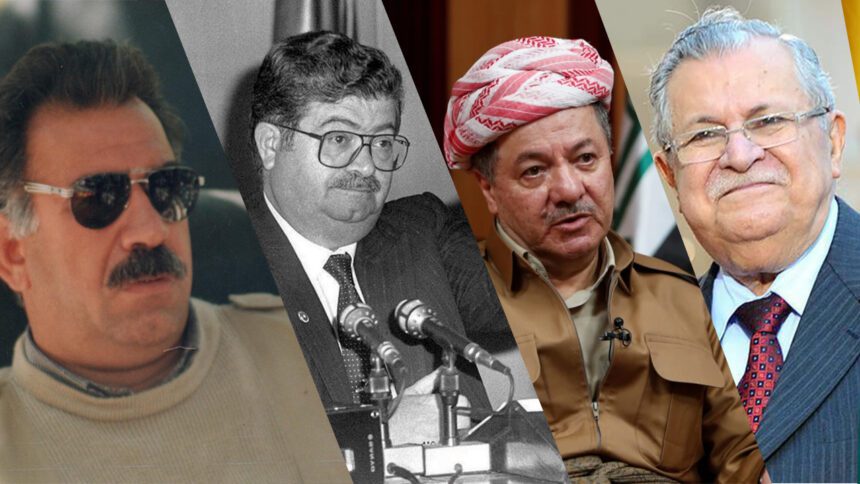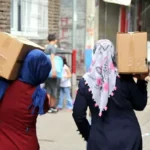Turkey’s Kurdish opening, a series of measures launched by the state in recent decades to address the Kurdish question, has its roots in the political and economic reforms initiated by Turgut Özal. As Turkey’s eighth president (1989–1993) and a key architect of its modernization, Özal played a transformative role in shifting official policy from repression to a cautious acknowledgment of Kurdish identity. Over the decades, the Kurdish opening has seen moments of progress and setbacks. However, the issue has taken on a new regional and global dimension following the ousting of Syrian President Bashar al-Assad, challenging Turkey’s domestic policies and cross-border Kurdish strategies.
Turgut Özal and the Foundations of the Kurdish Opening
Turgut Özal was the first Turkish leader to publicly recognize the existence of a “Kurdish issue,” moving beyond the conventional security-focused approach of the state. Privately, he advocated for lifting restrictions on the Kurdish language and identity, even supporting the use of Kurdish terms in informal settings. Under his leadership, Turkey took initial steps toward loosening strict assimilationist policies, allowing limited Kurdish broadcasting and cultural expressions.
Beyond domestic reforms, Özal also sought diplomatic engagement with Iraqi Kurdish leaders, including Jalal Talabani and Masoud Barzani. This marked a departure from Turkey’s traditional containment strategy, as Özal promoted dialogue rather than repression. His most significant peace initiative came in 1992 when he launched backchannel negotiations with Abdullah Öcalan, leader of the Kurdistan Workers’ Party (PKK). These efforts led to the PKK’s first unilateral ceasefire. However, Özal’s sudden death in April 1993 led to a resurgence of military operations, effectively ending peace efforts. Many argue that Özal was assassinated because of his ambition to resolve the Kurdish question, as his Kurdish Opening policy upset both regional and international actors who opposed a peaceful solution to the issue. His death, under suspicious circumstances, has fueled speculation that powerful interests sought to prevent a lasting resolution to the Kurdish problem and his regional ambitions.
The 1990s: Military Escalation and Regional Challenges
Following Özal’s death, the state resumed heavy-handed counterinsurgency tactics, deepening the divide between the Turkish government and the Kurdish population. However, this approach faced significant structural challenges. The PKK’s armed campaign intensified, proving that a purely military solution was untenable. The decade saw an unprecedented rise in violence, with forced displacements, village evacuations, and extrajudicial killings becoming widespread.
Meanwhile, regional developments further complicated Turkey’s position. The 1991 Gulf War and subsequent U.S. intervention in Iraq led to the establishment of the Kurdistan Regional Government (KRG). This weakened Turkey’s ability to contain cross-border Kurdish movements, as northern Iraq became a de facto autonomous Kurdish region. Concurrently, Turkey’s bid for European Union (EU) membership in 1999 brought new pressures for democratic reforms. The EU’s requirements pushed Turkey toward human rights improvements, including the abolition of the death penalty in 2002, which spared Öcalan from execution. Restrictions on Kurdish-language broadcasting and education were also relaxed, setting the stage for a more structured Kurdish opening under the Justice and Development Party (AKP).
.The AKP’s Kurdish Opening (2002–2009)
When the AKP came to power in 2002, it initially downplayed the Kurdish issue, prioritizing EU-driven democratization. However, a combination of domestic and international pressures pushed the government toward direct engagement. A pivotal moment came in 2005 when Prime Minister Recep Tayyip Erdoğan delivered a speech in Diyarbakır, in which he openly acknowledged state mistakes regarding the Kurdish issue and promised more democracy, citizenship rights, and economic prosperity for the region. While this speech was groundbreaking, it was not immediately followed by concrete policy changes.
The turning point in the Kurdish Opening came in 2007 when the National Security Council (MGK) formally decided to engage in dialogue with the PKK. Secret talks between Turkish intelligence (MIT) and PKK representatives commenced, marking a significant departure from previous state policies. By 2009, the Kurdish Opening was formally launched, leading to the establishment of TRT 6, Turkey’s first state-run Kurdish-language television channel. Additionally, university Kurdish language departments were introduced, and the PKK declared a ceasefire in May 2009. Despite these advances, the nationalist backlash against the return of PKK members via the Habur border crossing in 2009 led to a slowing down of the process, as public sentiment became more polarized.
The 2013–2015 Peace Process: A Missed Historic Opportunity
By 2013, both the state and PKK recognized that military solutions had reached a deadlock, prompting a renewed peace initiative. Abdullah Öcalan played a central role in this process, with his historic Newroz declaration in March 2013 calling for an end to armed conflict and for Kurdish rights to be secured through political means. In response, the PKK began withdrawing its fighters, and negotiations between the government and Kurdish representatives intensified. However, despite the initial momentum, the peace process lacked sufficient institutional guarantees, and when violent incidents, such as the assassination of two Turkish police officers in Ceylanpınar and the ISIS bombing of Kurdish activists in Suruç, occurred in 2015, trust between the parties collapsed.
In addition, the 2011 Syrian Civil War introduced a major geopolitical challenge for Turkey’s Kurdish policy. The emergence of the Autonomous Administration of North and East Syria (AANES), commonly known as Rojava, significantly altered Turkey’s security calculations. Ankara viewed the People’s Protection Units (YPG), the armed wing of the Syrian Democratic Forces (SDF), as an extension of the PKK, complicating ongoing peace talks. Turkey launched multiple military operations in Syria, including Operation Euphrates Shield (2016), Operation Olive Branch (2018), and Operation Peace Spring (2019), aimed at curbing Kurdish autonomy in northern Syria.
The collapse of the peace process between 2013 and 2015 echoed the failed attempts at reconciliation during Turgut Özal’s presidency. Just as Özal had sought a political resolution in 1993, only for his sudden death and subsequent hardline policies to derail progress, the post-2015 environment saw a return to militarized approaches. One of the key similarities between both periods was the opposition of powerful Western states to a negotiated resolution of the Kurdish conflict. While public discourse often framed these states as supporters of peace, in reality, some Western actors had strategic interests in maintaining the conflict, particularly to exert leverage over Turkey and the broader Middle East.
The collapse of the peace talks between the Turkish government and the PKK was also closely linked to the June 2015 general election results and broader political dynamics. In that election, Erdoğan’s Justice and Development Party (AKP) lost its parliamentary majority for the first time since coming to power in 2002. The AKP won 40.9% of the vote and secured 258 seats, falling short of the 276 needed for a majority. This result was largely influenced by the rise of the pro-Kurdish Peoples’ Democratic Party (HDP), which surpassed the 10% electoral threshold and entered parliament with 80 seats. Many analysts attribute the HDP’s success in the June 2015 elections to the peace process between the Turkish government and the PKK, which had been ongoing since 2013.
The “Handshake Process” of 2024 and Future Prospects
In October 2024, an unexpected political development occurred when Devlet Bahçeli, leader of the Nationalist Movement Party (MHP), publicly shook hands with officials from the Democratic Regions Party (DEM) in Parliament. This unprecedented gesture signaled a potential shift in the Turkish state’s approach to the Kurdish issue. Calls for the disarmament of the PKK gained traction, and Öcalan expressed support for renewed negotiations.
The situation took a dramatic turn in December 2024 with the ousting of Bashar al-Assad. The removal of Assad has left Syria fragmented, with Islamist groups, Kurdish factions, Arab tribal forces, and international actors vying for control. The “Handshake Process” may represent an effort to manage the Kurdish issue within Turkey while allowing Ankara to focus on shaping Syria’s post-Assad order.
What makes this period particularly significant is the shifting stance of Western powers, who historically opposed any resolution to the Kurdish issue that might have altered regional balances to their disadvantage. In the 1990s, Western nations—particularly the United States and certain European powers—viewed the Kurdish conflict as a tool to exert pressure on Turkey while ensuring that the region remained in a state of manageable instability. During the Syrian Civil War, Western actors initially supported Kurdish factions as strategic allies against ISIS, but as the conflict evolved, they recalibrated their approach to prioritize their broader geopolitical objectives over Kurdish aspirations.
Now, with the global geopolitical landscape heating up, the same Western powers that once resisted a peaceful resolution to the Kurdish question are emerging as key facilitators of the renewed dialogue. The handshake between Devlet Bahçeli, the leader of the Nationalist Movement Party (MHP), and officials from the Democratic Regions Party (DEM) in 2024 was not merely a spontaneous political gesture—it reflected a deeper shift influenced by Western diplomatic maneuvering. As tensions rise between NATO, Russia, China and other regional and international players, Western powers see an opportunity to use the Kurdish issue as a bargaining chip to realign Turkey’s role within the region. Encouraging peace talks allows them to exert positive influence over Ankara, mitigate Kurdish nationalist movements that could destabilize broader strategic interests, and leverage Turkey’s geostrategic position and military power in an increasingly multipolar world order.
This newfound Western support for dialogue is not purely altruistic; it is driven by pragmatic geopolitical considerations. NATO countries recognize that fostering internal stability within Turkey—especially by easing its long-standing Kurdish conflict—could serve to keep Ankara aligned with Western strategic interests. In this light, the Bahçeli handshake marks a calculated shift that intertwines the Kurdish opening with larger geopolitical dynamics, making it not just a domestic issue but a critical factor in international power struggles.
Moreover, Erdoğan’s political survival and potential succession strategy—possibly involving Bilal Erdoğan—are also central to the renewed peace process. His ally Bahçeli’s recent handshake gesture seems less like a sincere effort at reconciliation and more like a strategic move designed to bolster Erdoğan’s re-election prospects and advance his succession agenda.
Against this background and despite frequent tensions and rhetorical clashes, Western powers—especially the U.S., Israel and the EU—have often found Erdoğan useful for their geopolitical interests. While he presents himself as an independent leader balancing between the West, Russia, and other actors, his actions have frequently aligned with Western strategic goals in key areas and the regional ambitions of Israel.
Conclusion: The Kurdish Opening as an Unfinished Project
Turgut Özal’s approach to the Kurdish question was groundbreaking, emphasizing negotiation over repression. While his initial vision laid the groundwork for later peace initiatives, the process has remained uneven and fraught with setbacks. Today, with Assad’s removal reshaping regional dynamics, the Kurdish issue is no longer a purely domestic concern but a critical component of Turkey’s broader security strategy and the geopolitical objectives of the West.
The future of the current Kurdish opening hinges on Turkey’s ability to institutionalize political and cultural rights for Kurds while balancing regional security interests. Whether the “Handshake Process” represents a genuine opportunity for lasting peace or merely another fleeting moment of optimism remains to be seen. The success or failure of these efforts will ultimately determine whether Turkey can break the cycle of conflict or remain trapped in a pattern of unresolved tensions and missed opportunities for political gain.
By: News About Turkey (NAT)



